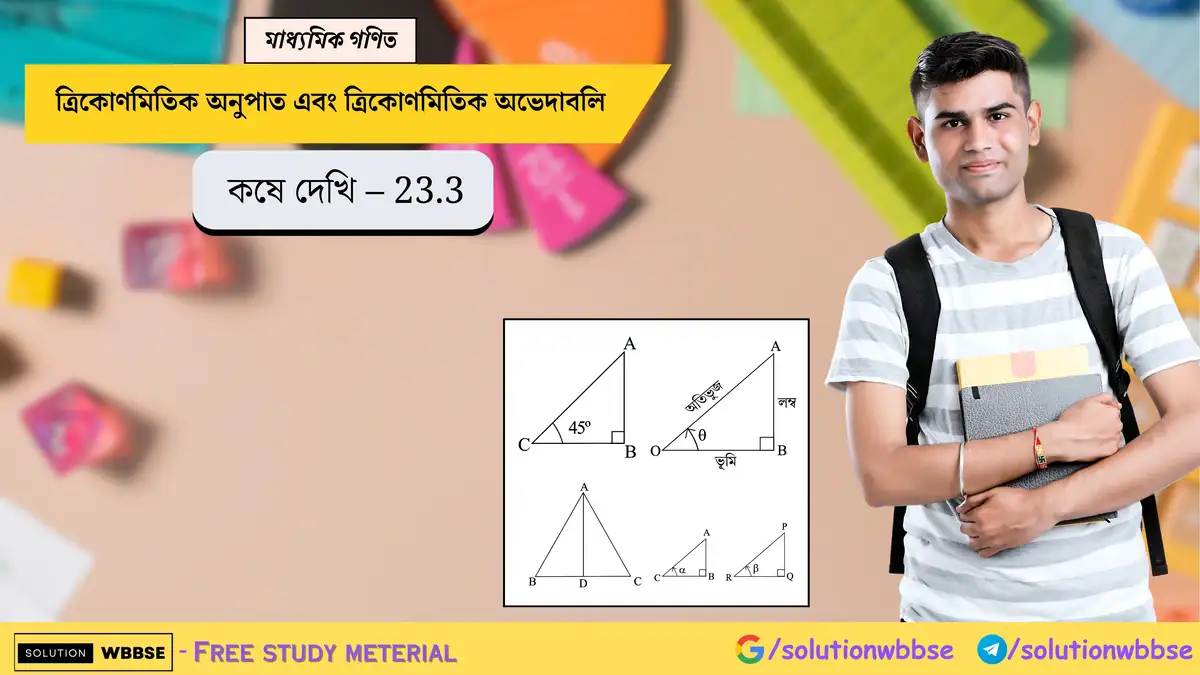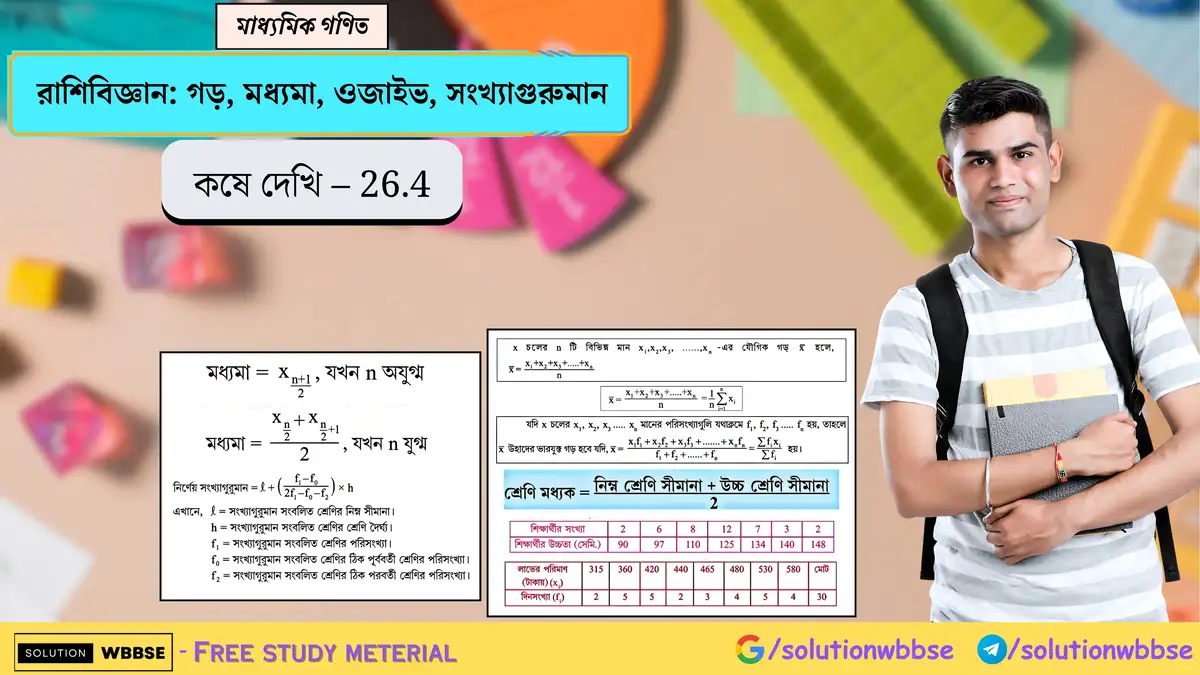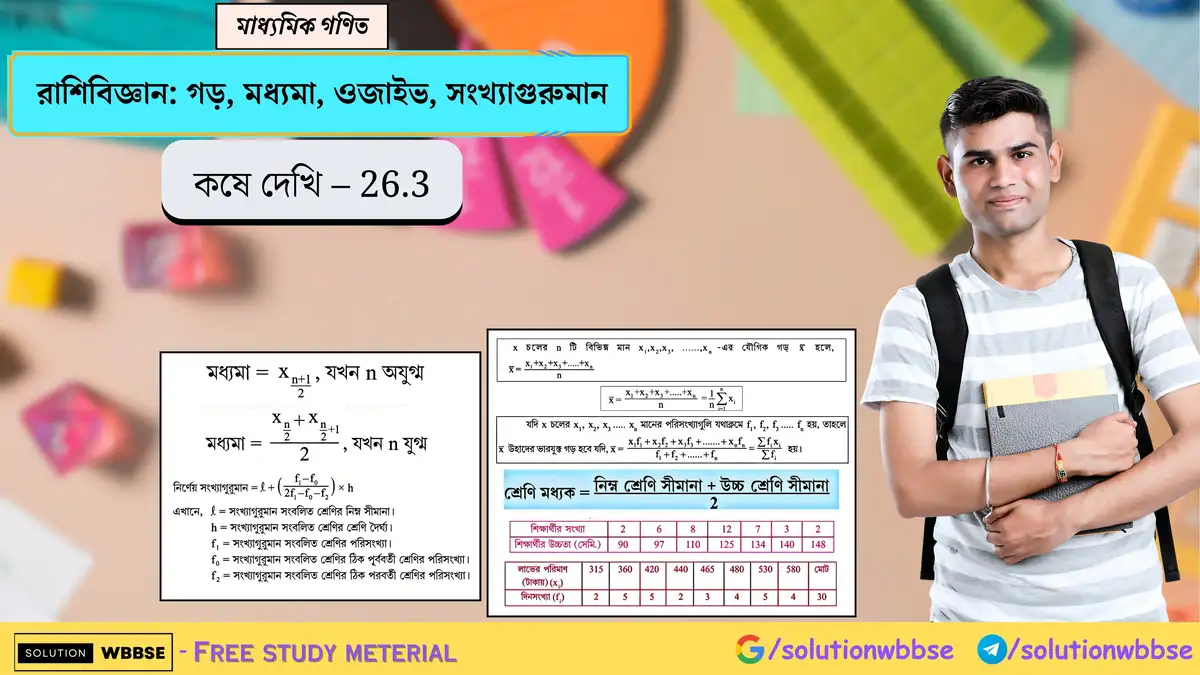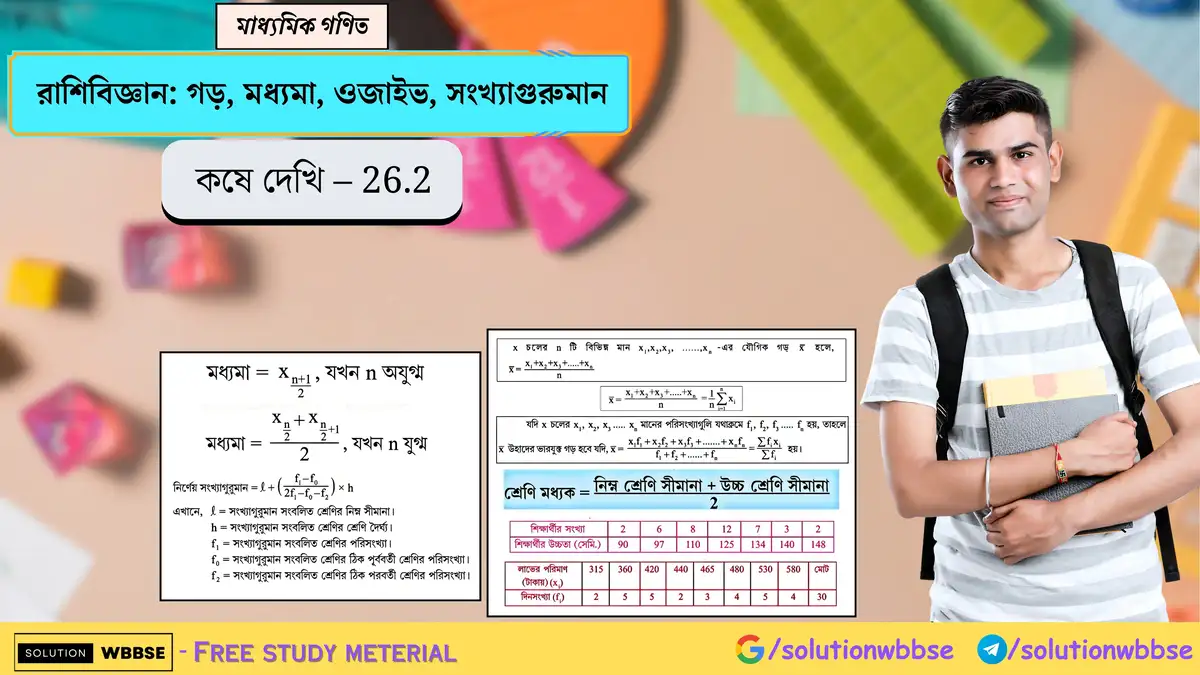এই আর্টিকেলে মাধ্যমিক (দশম শ্রেণী) গণিতের ত্রয়োবিংশ অধ্যায়, ‘ত্রিকোণমিতিক অনুপাত এবং ত্রিকোণমিতিক অভেদাবলি’ -এর ‘কষে দেখি – 23.3’ বিভাগের সমস্ত সমস্যার সমাধান করে দেওয়া হয়েছে। এই আর্টিকেলটি তোমাদের মাধ্যমিক পরীক্ষার প্রস্তুতিতে বিশেষভাবে সাহায্য করবে।

1. (i) \(\sin\theta = \frac{4}{5}\) হলে, \(\frac{\text{cosec}\theta}{1+\cot\theta}\) -এর মান হিসাব করে লিখি।
সমাধান –
\(\sin\theta = \frac{4}{5}\)\(\therefore \text{cosec}\theta = \frac{1}{\sin\theta}\) = \( \frac{1}{\frac{4}{5}}\) = \( \frac{5}{4}\)
আমরা জানি, \(\sin^2\theta + \cos^2\theta = 1\)
\(\therefore \cos\theta = \sqrt{1 – \sin^2\theta}\)
= \( \sqrt{1 – \left(\frac{4}{5}\right)^2}\)
= \( \sqrt{1 – \frac{16}{25}}\)
= \( \sqrt{\frac{25-16}{25}}\)
= \( \sqrt{\frac{9}{25}}\)
= \( \frac{3}{5}\)
\(\therefore \cot\theta = \frac{\cos\theta}{\sin\theta}\) = \( \frac{\frac{3}{5}}{\frac{4}{5}}\) = \( \frac{3}{4}\)
\(\therefore \frac{\text{cosec}\theta}{1+\cot\theta}\) = \( \frac{\frac{5}{4}}{1+\frac{3}{4}}\) = \( \frac{\frac{5}{4}}{\frac{7}{4}}\) = \( \frac{5}{7}\) [উত্তর]
1. (ii) যদি \(\tanθ = \frac{3}{4}\) হয়, তবে দেখাই যে \(\sqrt{\frac{1-sinθ}{1+sinθ}} = \frac{1}{2}\)
সমাধান –
ধরি, লম্ব = \(3k\) এবং ভূমি = \(4k\) [\(k (≠ 0)\) একটি সমানুপাতিক ধ্রুবক]
= \( \sqrt{\frac{1-\frac{3}{5}}{1+\frac{3}{5}}} \)
= \( \sqrt{\frac{\frac{2}{5}}{\frac{8}{5}}} \)
= \( \sqrt{\frac{2}{5} \times \frac{5}{8}} \)
= \( \sqrt{\frac{1}{4}} \)
= \( \frac{1}{2}\)
\(\therefore \sqrt{\frac{1-sinθ}{1+sinθ}} = \frac{1}{2}\) [প্রমাণিত]
1. (iii) \(\tanθ =1\) হলে, \(\frac{8\sinθ+5\cosθ}{\sin^3θ-2\cos^3θ+7\cosθ}\) -এর মান হিসাব করে লিখি।
সমাধান –
\(\tanθ = 1\)\(\therefore \frac{8\sinθ+5\cosθ}{\sin^3θ-2\cos^3θ+7\cosθ}\) = \( \frac{8 \times \frac{1}{\sqrt{2}} + 5 \times \frac{1}{\sqrt{2}}}{\left(\frac{1}{\sqrt{2}}\right)^3 – 2 \times \left(\frac{1}{\sqrt{2}}\right)^3 + 7 \times \frac{1}{\sqrt{2}}}\)
= \( \frac{\frac{13}{\sqrt{2}}}{\frac{1}{2\sqrt{2}} – \frac{2}{2\sqrt{2}} + \frac{7}{\sqrt{2}}}\)
= \( \frac{\frac{13}{\sqrt{2}}}{\frac{1-2+14}{2\sqrt{2}}} \)
= \( \frac{\frac{13}{\sqrt{2}}}{\frac{13}{2\sqrt{2}}}\)
= \( \frac{13}{\sqrt{2}} \times \frac{2\sqrt{2}}{13}\)
= \( 2\) [উত্তর]
2. (i) cosecθ এবং tan θ-কে sinθ -এর মাধ্যমে প্রকাশ করি।
সমাধান –
\(\tan\theta = \frac{\sin\theta}{\cos\theta} = \frac{\sin\theta}{\sqrt{1-\sin^2\theta}}\) [যেহেতু \(\sin^2\theta + \cos^2\theta = 1\)]
\(\therefore \text{cosec}\theta = \frac{1}{\sin\theta}\) এবং \(\tan\theta = \frac{\sin\theta}{\sqrt{1-\sin^2\theta}}\) [উত্তর]
2. (ii) cosecθ এবং tanθ -কে cosθ -এর মাধ্যমে লিখি।
সমাধান –
\(\text{cosec}\theta = \frac{1}{\sin\theta} = \frac{1}{\sqrt{1-\cos^2\theta}}\) [যেহেতু \(\sin^2\theta + \cos^2\theta = 1\)]
\(\tan\theta = \frac{\sin\theta}{\cos\theta} = \frac{\sqrt{1-\cos^2\theta}}{\cos\theta}\) [যেহেতু \(\sin^2\theta + \cos^2\theta = 1\)]
\(\therefore \text{cosec}\theta = \frac{1}{\sqrt{1-\cos^2\theta}}\) এবং \(\tan\theta = \frac{\sqrt{1-\cos^2\theta}}{\cos\theta}\) [উত্তর]
3. (i) \(\sec\theta + \tan\theta = 2\) হলে, \((\sec\theta – \tan\theta)\)-এর মান নির্ণয় করি।
সমাধান –
আমরা জানি,
\(\sec^2\theta – \tan^2\theta = 1\)বা, \((\sec\theta + \tan\theta)(\sec\theta – \tan\theta) = 1\)
বা, \((\sec\theta – \tan\theta) = \frac{1}{\sec\theta + \tan\theta}\)
বা, \((\sec\theta – \tan\theta) = \frac{1}{2}\)
∴ \((\sec\theta – \tan\theta) = \frac{1}{2}\) [উত্তর]
3. (ii) \(cosec\theta – \cot\theta = \sqrt{2} – 1\) হলে, \((cosec\theta + \cot\theta)\)–এর মান হিসাব করে লিখি।
সমাধান –
আমরা জানি,
\(cosec^2\theta – \cot^2\theta = 1\)বা, \((cosec\theta+\cot\theta)(cosec\theta-\cot\theta)=1\)
বা, \((cosec\theta+\cot\theta) \times (\sqrt{2} – 1) = 1\)
বা, \((cosec\theta+\cot\theta) = \frac{1}{\sqrt{2}-1} \times \frac{\sqrt{2}+1}{\sqrt{2}+1}\)
বা, \((cosec\theta+\cot\theta) = \frac{\sqrt{2}+1}{\{(\sqrt{2})^2 – 1^2\}}\)
বা, \((cosec\theta+\cot\theta) = \frac{\sqrt{2}+1}{2-1}\)
বা, \((cosec\theta+\cot\theta) = \sqrt{2} + 1\)
∴ \((cosec\theta+\cot\theta) = \sqrt{2} + 1\) [উত্তর]
3. (iii) \(\sin\theta + \cos\theta = 1\) হলে, \(\sin\theta \times \cos\theta\)-এর মান হিসাব করে লিখি।
সমাধান –
আমরা জানি,
\(\sin^2\theta + \cos^2\theta = 1\)বা, \((\sin\theta + \cos\theta)^2 – 2\sin\theta \times \cos\theta = 1\)
বা, \((1)^2 – 2\sin\theta \times \cos\theta = 1\)
বা, \(1 – 2\sin\theta \times \cos\theta = 1\)
বা, \(-2\sin\theta \times \cos\theta = 0\)
বা, \(\sin\theta \times \cos\theta = 0\)
∴ \(\sin\theta \times \cos\theta = 0\) [উত্তর]
3. (iv) \(\tan\theta + \cot\theta = 2\) হলে, \((\tan\theta – \cot\theta)\) এর মান হিসাব করে লিখি।
সমাধান –
\(\tan\theta + \cot\theta = 2\)বা, \(\tan\theta + \frac{1}{\tan\theta} = 2\)
বা, \(\frac{\tan^2\theta + 1}{\tan\theta} = 2\)
বা, \(\tan^2\theta + 1 = 2\tan\theta\)
বা, \(\tan^2\theta – 2\tan\theta + 1 = 0\)
বা, \((\tan\theta – 1)^2 = 0\)
বা, \(\tan\theta – 1 = 0\)
বা, \(\tan\theta = 1\)
∴ \(\cot\theta = \frac{1}{\tan\theta} = 1\)
∴ \(\tan\theta – \cot\theta = 1 – 1 = 0\)
∴ \((\tan\theta – \cot\theta)\)-এর মান \(0\) [উত্তর]
3. (v) \(\sin\theta – \cos\theta = \frac{7}{13}\) হলে, \(\sin\theta + \cos\theta\)-এর মান নির্ণয় করি।
সমাধান –
\(\sin^2\theta + \cos^2\theta = 1\)বা, \((\sin\theta – \cos\theta)^2 + 2\sin\theta\cos\theta = 1\)
বা, \(\left(\frac{7}{13}\right)^2 + 2\sin\theta\cos\theta = 1\)
বা, \(\frac{49}{169} + 2\sin\theta\cos\theta = 1\)
বা, \(2\sin\theta \cos\theta = 1 – \frac{49}{169}\)
বা, \(2\sin\theta\cos\theta = \frac{169-49}{169}\)
বা, \(2\sin\theta\cos\theta = \frac{120}{169}\)
এখন,
\((\sin\theta + \cos\theta)^2\)= \( \sin^2\theta + \cos^2\theta + 2\sin\theta\cos\theta\)
= \( 1 + \frac{120}{169}\)
= \( 1 + \frac{120}{169}\)
= \( \frac{169+120}{169}\)
= \( \frac{289}{169}\)
∴ \((\sin\theta + \cos\theta) = \sqrt{\frac{289}{169}}\) [ যেহেতু θ সূক্ষ্মকোণ ]
বা, \((\sin\theta + \cos\theta) = \frac{17}{13}\) [ উত্তর ]
3. (vi) \(\sin\theta \cos\theta = \frac{1}{2}\) হলে, \((\sin\theta + \cos\theta)\)–এর মান হিসাব করে লিখি।
সমাধান –
\((\sin\theta + \cos\theta)^2 = \sin^2\theta + 2\sin\theta\cos\theta + \cos^2\theta\)বা, \((\sin\theta + \cos\theta)^2 = (\sin^2\theta + \cos^2\theta) + 2\sin\theta\cos\theta\)
বা, \((\sin\theta + \cos\theta)^2 = 1 + 2 \times \frac{1}{2}\)
বা, \((\sin\theta + \cos\theta)^2 = 2\)
বা, \((\sin\theta + \cos\theta) = \sqrt{2}\) [যেহেতু θ সূক্ষ্মকোণ]
∴ \((\sin\theta + \cos\theta) = \sqrt{2}\) [উত্তর]
3. (vii) \(\sec\theta – \tan\theta = \frac{1}{\sqrt{3}}\) হলে, \(\sec\theta\) এবং \(\tan\theta\) উভয়ের মান নির্ণয় করি।
সমাধান –
\(\sec\theta – \tan\theta = \frac{1}{\sqrt{3}}\) [প্রদত্ত]—-(i)
আবার \(\sec^2\theta – \tan^2\theta = 1\)
বা, \((\sec\theta + \tan\theta)(\sec\theta – \tan\theta) = 1\)
বা, \((\sec\theta + \tan\theta) \times \frac{1}{\sqrt{3}} = 1\)
বা, \((\sec\theta + \tan\theta) = \sqrt{3}\) —–(ii)
(i) ও (ii) নং সমীকরণ যোগ করে পাই,
\(\sec\theta – \tan\theta + \sec\theta + \tan\theta = \frac{1}{\sqrt{3}} + \sqrt{3}\)বা, \(2\sec\theta = \frac{1 + 3}{\sqrt{3}}\)
বা, \(2\sec\theta = \frac{4}{\sqrt{3}}\)
বা, \(\sec\theta = \frac{2}{\sqrt{3}}\)
\(\sec\theta\)-এর প্রাপ্ত মান (ii) নং সমীকরণে বসিয়ে পাই,
\(\frac{2}{\sqrt{3}} + \tan\theta = \sqrt{3}\)বা, \(\tan\theta = \sqrt{3} – \frac{2}{\sqrt{3}}\)
বা, \(\tan\theta = \frac{3 – 2}{\sqrt{3}}\)
বা, \(\tan\theta = \frac{1}{\sqrt{3}}\)
∴ \(\sec\theta = \frac{2}{\sqrt{3}}\) এবং \(\tan\theta = \frac{1}{\sqrt{3}}\)
3. (viii) \(cosec\theta + \cot\theta = \sqrt{3}\) হলে, \(cosec\theta\) এবং \(\cot\theta\) উভয়ের মান নির্ণয় করি।
সমাধান –
\(cosec\theta + \cot\theta = \sqrt{3}\) – (i)
আবার, \(cosec^2\theta – \cot^2\theta = 1\)
বা, \((cosec\theta + \cot\theta)(cosec\theta – \cot\theta) = 1\)
বা, \(\sqrt{3} \times (cosec\theta – \cot\theta) = 1\)
বা, \((cosec\theta – \cot\theta) = \frac{1}{\sqrt{3}}\) —-(ii)
(i) নং ও (ii) নং সমীকরণ যোগ করে পাই,
\((cosec\theta + \cot\theta) + (cosec\theta – \cot\theta) = \sqrt{3} + \frac{1}{\sqrt{3}}\)বা, \(2 cosec\theta = \frac{3+1}{\sqrt{3}}\)
বা, \(2cosec\theta = \frac{4}{\sqrt{3}}\)
বা, \(cosec\theta = \frac{2}{\sqrt{3}}\)
আবার \(cosec\theta\) -এর মান (i) নং সমীকরণে বসিয়ে পাই,
\(cosec\theta + \cot\theta = \sqrt{3}\)বা, \(\frac{2}{\sqrt{3}} + \cot\theta = \sqrt{3}\)
বা, \(\cot\theta = \sqrt{3} – \frac{2}{\sqrt{3}}\)
বা, \(\cot\theta = \frac{3-2}{\sqrt{3}}\)
বা, \(\cot\theta = \frac{1}{\sqrt{3}}\)
∴ \(cosec\theta = \frac{2}{\sqrt{3}}\) এবং \(\cot\theta = \frac{1}{\sqrt{3}}\) [উত্তর]
3. (ix) \(\frac{\sin\theta+\cos\theta}{\sin\theta-\cos\theta} = 7\) হলে, \(\tan\theta\) -এর মান হিসাব করে লিখি।
সমাধান –
\(\frac{\sin\theta+\cos\theta}{\sin\theta-\cos\theta} = 7\)বা, \(\sin\theta+\cos\theta = 7(\sin\theta-\cos\theta)\)
বা, \(\sin\theta+\cos\theta = 7\sin\theta-7\cos\theta\)
বা, \(\cos\theta+7\cos\theta = 7\sin\theta-\sin\theta\)
বা, \(8\cos\theta = 6\sin\theta\)
বা, \(8 = 6\frac{\sin\theta}{\cos\theta}\)
বা, \(8 = 6\tan\theta\)
বা, \(\tan\theta = \frac{8}{6}\)
বা, \(\tan\theta = \frac{4}{3}\)
\(\therefore \tan\theta = \frac{4}{3}\) [ উত্তর ]
3. (x) \(\frac{cosec\theta+\sin\theta}{cosec\theta-\sin\theta} = \frac{5}{2}\) হলে, \(\sin\theta\) -এর মান হিসাব করে লিখি।
সমাধান –
\(\frac{cosec\theta+\sin\theta}{cosec\theta-\sin\theta} = \frac{5}{2}\)বা, \(2(cosec\theta+\sin\theta) = 5(cosec\theta-\sin\theta)\)
বা, \(2cosec\theta +2\sin\theta = 5 cosec\theta -5\sin\theta\)
বা, \(2\sin\theta+5\sin\theta = 5cosec\theta -2cosec\theta\)
বা, \(7\sin\theta = 3 cosec\theta\)
বা, \(7\sin\theta = \frac{3}{\sin\theta}\)
বা, \(7\sin^2\theta = 3\)
বা, \(\sin^2\theta = \frac{3}{7}\)
বা, \(\sin\theta = \sqrt{\frac{3}{7}}\) [ যেহেতু \(\theta\) সূক্ষ্মকোণ ]
\(\therefore \sin\theta = \sqrt{\frac{3}{7}}\) [উত্তর]
3. (xi) \(\sec\theta+\cos\theta = \frac{5}{2}\) হলে, \((\sec\theta -\cos\theta)\)-এর মান হিসাব করে লিখি।
সমাধান –
\(\sec\theta+\cos\theta = \frac{5}{2}\)এবং \((\sec\theta+\cos\theta)^2 = (\sec\theta-\cos\theta)^2+4\sec\theta\cos\theta\)
বা, \((\frac{5}{2})^2 = (\sec\theta-\cos\theta)^2+4\times\frac{1}{\cos\theta}\times\cos\theta\)
বা, \(\frac{25}{4} = (\sec\theta-\cos\theta)^2+4\)
বা, \((\sec\theta-\cos\theta)^2 = \frac{25}{4}-4\)
বা, \((\sec\theta-\cos\theta)^2 = \frac{25-16}{4}\)
বা, \((\sec\theta-\cos\theta)^2 = \frac{9}{4}\)
বা, \((\sec\theta-\cos\theta)^2 = (\frac{3}{2})^2\)
বা, \((\sec\theta-\cos\theta) = \frac{3}{2}\)
\(\therefore (\sec\theta-\cos\theta) = \frac{3}{2}\) [উত্তর]
3. (xii) \(5\sin^2\theta+4\cos^2\theta = \frac{9}{2}\) সম্পর্কটি থেকে \(\tan\theta\) -এর মান নির্ণয় করি।
সমাধান –
\(5\sin^2\theta+4\cos^2\theta = \frac{9}{2}\)বা, \(2(5\sin^2\theta+4\cos^2\theta) = 9\)
বা, \(10\sin^2\theta + 8\cos^2\theta = 9\)
বা, \(10\sin^2\theta + 8 \cos^2\theta = 9(\sin^2\theta+\cos^2\theta)\) [ যেহেতু \(\sin^2\theta+\cos^2\theta = 1\) ]
বা, \(10\sin^2\theta – 9\sin^2\theta = 9 \cos^2\theta -8\cos^2\theta\)
বা, \(\sin^2\theta = \cos^2\theta\)
বা, \(\frac{\sin^2\theta}{\cos^2\theta} = 1\)
বা, \((\frac{\sin\theta}{\cos\theta})^2 = 1\)
বা, \(\tan^2\theta = 1\)
বা, \(\tan\theta = 1\)
\(\therefore \tan\theta = 1\) [উত্তর]
3. (xiii) \(\tan^2\theta + \cot^2\theta = \frac{10}{3}\) হলে, \(\tan\theta+\cot\theta\) এবং \(\tan\theta-\cot\theta\) -এর মান হিসাব করি এবং সেখান থেকে \(\tan\theta\) -এর মান হিসাব করে লিখি।
সমাধান –
\(\tan^2\theta + \cot^2\theta = \frac{10}{3}\)বা, \((\tan\theta+\cot\theta)^2 -2\tan\theta \cot\theta = \frac{10}{3}\)
বা, \((\tan\theta+\cot\theta)^2 -2\times\tan\theta\times\frac{1}{\tan\theta} = \frac{10}{3}\)
বা, \((\tan\theta+\cot\theta)^2-2 = \frac{10}{3}\)
বা, \((\tan\theta+\cot\theta)^2 = 2+\frac{10}{3}\)
বা, \((\tan\theta+\cot\theta)^2 = \frac{16}{3}\)
বা, \((\tan\theta+\cot\theta) = \sqrt{\frac{16}{3}}\)
বা, \((\tan\theta+\cot\theta) = \frac{4}{\sqrt{3}}\)
আবার, \(\tan^2\theta + \cot^2\theta = \frac{10}{3}\)
বা, \((\tan\theta-\cot\theta)^2 +2\tan\theta \cot\theta = \frac{10}{3}\)
বা, \((\tan\theta-\cot\theta)^2 +2\times\tan\theta\times\frac{1}{\tan\theta} = \frac{10}{3}\)
বা, \((\tan\theta-\cot\theta)^2+2 = \frac{10}{3}\)
বা, \((\tan\theta-\cot\theta)^2 = \frac{10}{3}-2\)
বা, \((\tan\theta-\cot\theta)^2 = \frac{4}{3}\)
বা, \((\tan\theta-\cot\theta) = \pm \frac{2}{\sqrt{3}}\)
\(\therefore (\tan\theta+\cot\theta) = \frac{4}{\sqrt{3}}\) এবং \((\tan\theta-\cot\theta) = \pm \frac{2}{\sqrt{3}}\) [উত্তর]
যখন \((\tan\theta-\cot\theta) = \frac{2}{\sqrt{3}}\)
\(\therefore 2\tan\theta = (\tan\theta+\cot\theta)+(\tan\theta-\cot\theta) = \frac{4}{\sqrt{3}}+\frac{2}{\sqrt{3}} = \frac{6}{\sqrt{3}}\)\(\therefore \tan\theta = \frac{6}{2\sqrt{3}} = \frac{3}{\sqrt{3}} = \frac{3\times\sqrt{3}}{\sqrt{3}\times\sqrt{3}} = \frac{3\sqrt{3}}{3} = \sqrt{3}\)\(\therefore \tan\theta = \sqrt{3}\) [ উত্তর ]
আবার যখন \((\tan\theta-\cot\theta) = -\frac{2}{\sqrt{3}}\)
\(\therefore 2\tan\theta =(\tan\theta+\cot\theta)+(\tan\theta-\cot\theta) = \frac{4}{\sqrt{3}}-\frac{2}{\sqrt{3}} = \frac{2}{\sqrt{3}}\)\(\therefore \tan\theta = \frac{1}{\sqrt{3}}\) [ উত্তর ]
3. (xiv) \(\sec^4\theta-\tan^4\theta = \frac{13}{12}\) হলে, \((\sec^2\theta-\tan^2\theta)\)-এর মান হিসাব করে লিখি।
সমাধান –
\((\sec^4\theta-\tan^4\theta)\)= \( (\sec^2\theta)^2-(\tan^2\theta)^2\)
= \( (\sec^2\theta+\tan^2\theta)(\sec^2\theta-\tan^2\theta)\)
= \( \frac{13}{12} \times 1\)
= \( \frac{13}{12}\)\(\therefore (\sec^4\theta-\tan^4\theta) = \frac{13}{12}\) [উত্তর]
4. (i) PQR ত্রিভুজে ∠Q সমকোণ। PR = \(\sqrt{5}\) একক এবং PQ-RQ = 1 একক হলে, cosP –cosR -এর মান নির্ণয় করি।
সমাধান –
PQR ত্রিভুজে ∠Q সমকোণ এবং PR = \(\sqrt{5}\) একক
∠P এর সাপেক্ষে PQ ভূমি এবং PR অতিভুজ।
\(\therefore \cos P = \frac{PQ}{PR}\) —(i)
আবার R এর সাপেক্ষে QR ভূমি এবং PR লম্ব
\(\therefore \cos R = \frac{QR}{PR}\) —(ii)
PQ-RQ = 1
বা, \(\frac{PQ-RQ}{PR} = \frac{1}{PR}\)
বা, \(\frac{PQ}{PR} – \frac{RQ}{PR} = \frac{1}{\sqrt{5}}\)
বা, \(\cos P – \cos R = \frac{1}{\sqrt{5}}\) [(i) ও (ii) থেকে পাই ]
\(\therefore \cos P – \cos R = \frac{1}{\sqrt{5}}\) [উত্তর]
4. (ii) XYZ ত্রিভুজে ∠Y সমকোণ । XY = \(2\sqrt{3}\) একক এবং XZ-YZ =2 একক হলে, (secX-tanX) -এর মান নির্ণয় কর।
সমাধান –
XYZ ত্রিভুজে ∠Y সমকোণ এবং XY = \(2\sqrt{3}\) একক ।
∠X এর সাপেক্ষে YZ লম্ব এবং XY ভূমি এবং XZ অতিভুজ
\(\therefore \sec X = \frac{XZ}{XY}\) এবং \(\tan X = \frac{YZ}{XY}\)
XZ-YZ=2
বা, \(\frac{XZ-YZ}{XY} = \frac{2}{XY}\) [ উভয়পক্ষকে XY দ্বারা ভাগ করে পাই ]
বা, \(\frac{XZ}{XY} – \frac{YZ}{XY} = \frac{2}{2\sqrt{3}}\)
বা, \(\sec X-\tan X = \frac{1}{\sqrt{3}}\)
\(\therefore \sec X-\tan X = \frac{1}{\sqrt{3}}\) [উত্তর]
5. সম্পর্কগুলি থেকে ‘\(\theta\)‘ অপনয়ন করি
(i) \(x = 2\sin\theta\), \(y = 3\cos\theta\)
সমাধান –
\(x = 2\sin\theta\), \(y = 3\cos\theta\)
\(\therefore x^2 = 4\sin^2\theta\)বা, \(\frac{x^2}{4} = \sin^2\theta\)
এবং \(y^2 = 9\cos^2\theta\)
বা, \(\frac{y^2}{9} = \cos^2\theta\)
\(\therefore \frac{x^2}{4} + \frac{y^2}{9} = (\sin^2\theta + \cos^2\theta) = 1\)\(\therefore \frac{x^2}{4} + \frac{y^2}{9} = 1\) [উত্তর]
(ii) \(5x = 3\sec\theta\), \(y = 3\tan\theta\)
সমাধান –
\(5x = 3\sec\theta\)বা, \(\sec\theta = \frac{5x}{3}\)
বা, \(\sec^2\theta = \frac{25x^2}{9}\)
আবার, \(y = 3\tan\theta\)
বা, \(\tan\theta = \frac{y}{3}\)
বা, \(\tan^2\theta = \frac{y^2}{9}\)
আমরা জানি,
\(\sec^2\theta – \tan^2\theta = 1\)বা, \(\frac{25x^2}{9} – \frac{y^2}{9} = 1\)
বা, \(25x^2 – y^2 = 9\)
\(\therefore\) নির্ণেয় সম্পর্ক (\(\theta\) বর্জিত) টি হল \(25x^2 – y^2 = 9\)
6. (i) যদি \(\sin\alpha = \frac{5}{13}\) হয়, তাহলে দেখাই যে, \(\tan\alpha + \sec\alpha = 1.5\)
সমাধান –
\(\sin\alpha = \frac{5}{13}\)\(\therefore \cos\alpha = \sqrt{1 – \sin^2\alpha} \)= \( \sqrt{1 – (\frac{5}{13})^2} \)
= \( \sqrt{1 – \frac{25}{169}} \)
= \( \sqrt{\frac{144}{169}} \)
= \( \frac{12}{13}\)
\(\therefore \tan\alpha = \frac{\sin\alpha}{\cos\alpha} = \frac{\frac{5}{13}}{\frac{12}{13}} = \frac{5}{13} \times \frac{13}{12} = \frac{5}{12}\)এবং \(\sec\alpha = \frac{1}{\cos\alpha} = \frac{1}{\frac{12}{13}} = \frac{13}{12}\)
\(\therefore (\tan\alpha + \sec\alpha)\)= \( \frac{5}{12} + \frac{13}{12}\)
= \( \frac{18}{12}\)
= \( \frac{3}{2}\)
= \( 1.5\)
\(\therefore (\tan\alpha + \sec\alpha) = 1.5\) [প্রমাণিত]
6. (ii) যদি \(\tan A = \frac{n}{m}\) হয়, তাহলে \(\sin A\) ও \(\sec A\) উভয়ের মান নির্ণয় কর।
সমাধান –
\(\tan A = \frac{n}{m}\)আমরা জানি, \(\sec^2\theta – \tan^2\theta = 1\)
\(\therefore \sec A = \sqrt{1+\tan^2 A} \)= \(\sqrt{1+\left(\frac{n}{m}\right)^2} \)
= \(\sqrt{1+\frac{n^2}{m^2}} \)
= \(\sqrt{\frac{m^2+n^2}{m^2}} \)
= \(\frac{\sqrt{m^2+n^2}}{m}\)
\(\therefore \cos A = \frac{1}{\sec A} = \frac{1}{\frac{\sqrt{m^2+n^2}}{m}} = \frac{m}{\sqrt{m^2+n^2}}\)আবার, \(\sin^2\theta + \cos^2\theta = 1\)
\(\therefore \sin A = \sqrt{1-\cos^2 A} \)= \(\sqrt{1 – \left(\frac{m}{\sqrt{m^2+n^2}}\right)^2} \)
= \(\sqrt{1-\frac{m^2}{m^2+n^2}} \)
= \(\sqrt{\frac{m^2+n^2-m^2}{m^2+n^2}} \)
= \(\sqrt{\frac{n^2}{m^2+n^2}} \)
= \(\frac{n}{\sqrt{m^2+n^2}}\)
\(\therefore \sec A = \frac{\sqrt{m^2+n^2}}{m}\) এবং \(\sin A = \frac{n}{\sqrt{m^2+n^2}}\)
বিকল্প পদ্ধতি –
ধরি, লম্ব = \(nk\) এবং ভূমি = \(mk\) [ \(k(\neq 0)\) একটি আনুপাতিক ধ্রুবক ]
∴\(\therefore \sec A = \frac{\sqrt{m^2+n^2}}{m}\) এবং \(\sin A = \frac{n}{\sqrt{m^2+n^2}}\)
6. (iii) যদি \(\cos\theta = \frac{x}{\sqrt{x^2+y^2}}\) হয়, তাহলে দেখাই যে, \(x \sin\theta = y \cos\theta\)
সমাধান –
\(\cos\theta = \frac{x}{\sqrt{x^2+y^2}}\)আমরা জানি, \(\sin^2\theta + \cos^2\theta = 1\)
\(\therefore \sin\theta = \sqrt{1-\cos^2\theta} \)= \( \sqrt{1 – \left(\frac{x}{\sqrt{x^2+y^2}}\right)^2} \)
= \( \sqrt{1 – \frac{x^2}{x^2+y^2}} \)
= \( \sqrt{\frac{x^2+y^2-x^2}{x^2+y^2}} \)
= \( \sqrt{\frac{y^2}{x^2+y^2}} \)
= \( \frac{y}{\sqrt{x^2+y^2}}\)
\(\therefore x \sin\theta = x \times \frac{y}{\sqrt{x^2+y^2}} = \frac{xy}{\sqrt{x^2+y^2}}\)\(y \cos\theta = y \times \frac{x}{\sqrt{x^2+y^2}} = \frac{xy}{\sqrt{x^2+y^2}}\)\(\therefore x \sin\theta = y \cos\theta\) [প্রমাণিত]
6. (iv) যদি \(\sin\alpha = \frac{a^2-b^2}{a^2+b^2}\) হয়, তবে দেখাও যে, \(\cot\alpha = \frac{2ab}{a^2-b^2}\)
সমাধান –
\(\sin\alpha = \frac{a^2-b^2}{a^2+b^2}\)আমরা জানি, \(\sin^2\alpha + \cos^2\alpha = 1\)
\(\therefore \cos\alpha = \sqrt{1 – \sin^2\alpha} \)= \( \sqrt{1 – \left(\frac{a^2-b^2}{a^2+b^2}\right)^2} \)
= \( \sqrt{\frac{(a^2+b^2)^2 – (a^2-b^2)^2}{(a^2+b^2)^2}} \)
= \( \sqrt{\frac{4a^2b^2}{(a^2+b^2)^2}} \)
= \( \frac{2ab}{(a^2+b^2)}\)
\(\therefore \cot\alpha = \frac{\cos\alpha}{\sin\alpha} = \frac{\frac{2ab}{a^2+b^2}}{\frac{a^2-b^2}{a^2+b^2}} = \frac{2ab}{a^2-b^2}\)\(\therefore \cot\alpha = \frac{2ab}{a^2-b^2}\) [প্রমাণিত]
6. (v) যদি \(\frac{\sin\theta}{x} = \frac{\cos\theta}{y}\) হয়, তাহলে দেখাই যে, \(\sin\theta – \cos\theta = \frac{x-y}{\sqrt{x^2+y^2}}\)
সমাধান –
\(\frac{\sin\theta}{x} = \frac{\cos\theta}{y}\)বা, \(\frac{\sin\theta}{\cos\theta} = \frac{x}{y}\)
বা, \(\tan\theta = \frac{x}{y}\)
আমরা জানি, \(\sec^2\theta – \tan^2\theta = 1\)
\(\therefore \sec\theta = \sqrt{1+\tan^2\theta} \)= \( \sqrt{1+(\frac{x}{y})^2} \)
= \( \sqrt{\frac{y^2+x^2}{y^2}} \)
= \( \frac{\sqrt{y^2+x^2}}{y}\)
\(\therefore \cos\theta = \frac{1}{\sec\theta} = \frac{1}{\frac{\sqrt{y^2+x^2}}{y}} = \frac{y}{\sqrt{x^2+y^2}}\)আমরা জানি, \(\sin^2\theta + \cos^2\theta = 1\)
\(\therefore \sin\theta = \sqrt{1-\cos^2\theta} \)= \( \sqrt{1-\left(\frac{y}{\sqrt{x^2+y^2}}\right)^2} \)
= \(\sqrt{1-\frac{y^2}{x^2+y^2}} \)
= \(\sqrt{\frac{x^2+y^2-y^2}{x^2+y^2}} \)
= \(\sqrt{\frac{x^2}{x^2+y^2}} \)
= \(\frac{x}{\sqrt{x^2+y^2}}\)
\(\therefore \sin\theta – \cos\theta\) = \( \frac{x}{\sqrt{x^2+y^2}} – \frac{y}{\sqrt{x^2+y^2}}\)
= \( \frac{x-y}{\sqrt{x^2+y^2}}\)
\(\therefore \sin\theta – \cos\theta = \frac{x-y}{\sqrt{x^2+y^2}}\) [প্রমাণিত]
6. (vi) যদি \((1+4x^2)\cos A = 4x\) হয়, তাহলে দেখাই যে, \(\text{cosec}A + \cot A = \frac{1+2x}{1-2x}\)
সমাধান –
\((1+4x^2)\cos A = 4x\)বা, \(\cos A = \frac{4x}{1+4x^2}\)
বা, \(\cos^2 A = \left(\frac{4x}{1+4x^2}\right)^2\)
বা, \(1 – \sin^2 A = \frac{16x^2}{(1+4x^2)^2}\) [যেহেতু \(\sin^2 A + \cos^2 A = 1\)]
বা, \(1 – \frac{16x^2}{(1+4x^2)^2} = \sin^2 A\)
বা, \(\frac{(1+4x^2)^2 – 16x^2}{(1+4x^2)^2} = \sin^2 A\)
বা, \(\frac{1+8x^2+16x^4-16x^2}{(1+4x^2)^2} = \sin^2 A\)
বা, \(\frac{1-8x^2+16x^4}{(1+4x^2)^2} = \sin^2 A\)
বা, \(\frac{(1-4x^2)^2}{(1+4x^2)^2} = \sin^2 A\)
\(\therefore \sin A = \frac{1-4x^2}{1+4x^2}\)\(\therefore \text{cosec}A = \frac{1}{\sin A} = \frac{1}{\frac{1-4x^2}{1+4x^2}} = \frac{1+4x^2}{1-4x^2}\)\(\cot A = \frac{\cos A}{\sin A} = \frac{\frac{4x}{1+4x^2}}{\frac{1-4x^2}{1+4x^2}} = \frac{4x}{1-4x^2}\)\(\therefore \text{cosec}A + \cot A\) = \( \frac{1+4x^2}{1-4x^2} + \frac{4x}{1-4x^2}\)
= \( \frac{1+4x^2+4x}{1-4x^2}\)
= \( \frac{1+4x+4x^2}{1-4x^2}\)
= \( \frac{(1+2x)^2}{(1^2 – (2x)^2)}\)
= \( \frac{(1+2x)^2}{(1+2x)(1-2x)}\)
= \( \frac{(1+2x)}{(1-2x)}\)
\(\therefore \text{cosec}A + \cot A = \frac{1+2x}{1-2x}\) [প্রমাণিত]
7. যদি \(x = a\sin\theta\) এবং \(y = b\tan\theta\) হয়, তাহলে প্রমাণ করি যে, \(\frac{a^2}{x^2} – \frac{b^2}{y^2} = 1\)
সমাধান –
\(x = a\sin\theta\)বা, \(\sin\theta = \frac{x}{a}\)
বা, \(\frac{1}{\sin\theta} = \frac{1}{\frac{x}{a}}\)
বা, \(\text{cosec}\theta = \frac{a}{x}\)
এবং \(y = b\tan\theta\)
বা, \(\tan\theta = \frac{y}{b}\)
বা, \(\frac{1}{\tan\theta} = \frac{1}{\frac{y}{b}}\)
বা, \(\cot\theta = \frac{b}{y}\)
আমরা জানি, \(\text{cosec}^2\theta – \cot^2\theta = 1\)
বা, \((\frac{a}{x})^2 – (\frac{b}{y})^2 = 1\)
বা, \(\frac{a^2}{x^2} – \frac{b^2}{y^2} = 1\)
\(\therefore \frac{a^2}{x^2} – \frac{b^2}{y^2} = 1\) [প্রমাণিত]
8. যদি \(\sin\theta + \sin^2\theta = 1\) হয়, তাহলে প্রমাণ করি যে, \(\cos^2\theta + \cos^4\theta = 1\)
সমাধান –
\(\sin\theta + \sin^2\theta = 1\)বা, \(\sin\theta = 1 – \sin^2\theta\)
বা, \(\sin\theta = \cos^2\theta\)
\(\therefore \cos^2\theta + \cos^4\theta\) = \( \cos^2\theta + (\cos^2\theta)^2\)
= \( \sin\theta + \sin^2\theta\) [ যেহেতু \(\sin\theta = \cos^2\theta\) ]
= \( 1\) [যেহেতু \(\sin\theta + \sin^2\theta = 1\) ]
\(\therefore \cos^2\theta + \cos^4\theta = 1\) [প্রমাণিত]
9. অতিসংক্ষিপ্ত উত্তরধর্মী প্রশ্ন (V.S.A.)
(i) যদি \(3x = \text{cosec}\alpha\) এবং \(\frac{3}{x} = \cot\alpha\) হয়, তাহলে \(3(x^2 – \frac{1}{x^2})\)-এর মান
(a) \(\frac{1}{27}\)
(b) \(\frac{1}{81}\)
(c) \(\frac{1}{3}\)
(d) \(\frac{1}{9}\)
Ans – (c) \(\frac{1}{3}\)
সমাধান –
\(3x = \text{cosec}\alpha\)\(\therefore \text{cosec}\alpha = 3x\)বা, \(\text{cosec}^2\alpha = 9x^2\)
আবার \(\cot\alpha = \frac{3}{x}\)
বা, \(\cot^2\alpha = \frac{9}{x^2}\)
আমরা জানি, \(\text{cosec}^2\alpha – \cot^2\alpha = 1\)
\(\therefore 9x^2 – \frac{9}{x^2} = 1\)বা, \(9(x^2 – \frac{1}{x^2}) = 1\)
বা, \((x^2 – \frac{1}{x^2}) = \frac{1}{9}\)
\(\therefore 3(x^2 – \frac{1}{x^2}) = 3 \cdot \frac{1}{9}\)বা, \(3(x^2 – \frac{1}{x^2}) = \frac{1}{3}\)
\(\therefore 3(x^2 – \frac{1}{x^2}) = \frac{1}{3}\) [উত্তর]
(ii) যদি \(2x = \sec A\) এবং \(\frac{2}{x} = \tan A\) হয়, তাহলে \(2(x^2 – \frac{1}{x^2})\)-এর মান
(a) \(\frac{1}{2}\)
(b) \(\frac{1}{4}\)
(c) \(\frac{1}{8}\)
(d) \(\frac{1}{16}\)
Ans: (a) \(\frac{1}{2}\)
সমাধানঃ
\(2x = \sec A\) এবং \(\frac{2}{x} = \tan A\)
আমরা জানি,
\(\sec^2 A – \tan^2 A = 1\)বা, \((2x)^2 – (\frac{2}{x})^2 = 1\)
বা, \(4x^2 – \frac{4}{x^2} = 1\)
বা, \(4(x^2 – \frac{1}{x^2}) = 1\)
বা, \(2(x^2 – \frac{1}{x^2}) = \frac{1}{2}\)
\(\therefore 2(x^2 – \frac{1}{x^2}) = \frac{1}{2}\) [উত্তর]
(iii) \(\tan\alpha + \cot\alpha = 2\) হলে, \((\tan^{13}\alpha + \cot^{13}\alpha)\)-এর মান
(a) 1
(b) 0
(c) 2
(d) \(\frac{1}{16}\)
Ans: (c) 2
সমাধান – \(\tan\alpha + \cot\alpha = 2\)
বা, \(\tan\alpha + \frac{1}{\tan\alpha} = 2\)
বা, \(\frac{\tan^2\alpha+1}{\tan\alpha} = 2\)
বা, \(\tan^2\alpha + 1 = 2\tan\alpha\)
বা, \(\tan^2\alpha – 2\tan\alpha + 1 = 0\)
বা, \((\tan\alpha – 1)^2 = 0\)
বা, \((\tan\alpha – 1) = 0\)
বা, \(\tan\alpha = 1\)
\(\therefore \cot\alpha = \frac{1}{\tan\alpha} = 1\)\(\therefore (\tan^{13}\alpha + \cot^{13}\alpha)\) = \((1)^{13} + (1)^{13}\)
= \( 1+1\)
= \(2\) [উত্তর]
(iv) যদি \( \sin\theta – \cos\theta = 0 \) (\( 0^\circ \leq \theta \leq 90^\circ \)) এবং \( \sec\theta + \operatorname{cosec}\theta = x \) হয়, তাহলে \( x \) এর মান
(a) \( 1 \)
(b) \( 2 \)
(c) \( \sqrt{2} \)
(d) \( 2\sqrt{2} \)
Ans – (d) \( 2\sqrt{2} \)
সমাধান –
\( \sin\theta – \cos\theta = 0 \)বা, \( \sin\theta = \cos\theta \)
বা, \( \frac{\sin\theta}{\cos\theta} = 1 \)
বা, \( \tan\theta = 1 \)
বা, \( \tan\theta = \tan 45^\circ \)
বা, \( \theta = 45^\circ \)
∴ \( \sec\theta + \operatorname{cosec}\theta = x \)
বা, \( \sec 45^\circ + \operatorname{cosec} 45^\circ = x \)
বা, \( \sqrt{2} + \sqrt{2} = x \)
বা, \( 2\sqrt{2} = x \) [উত্তর]
(v) \( 2\cos 3\theta = 1 \) হলে, \( \theta \)-এর মান
(a) \( 10^\circ \)
(b) \( 15^\circ \)
(c) \( 20^\circ \)
(d) \( 30^\circ \)
Ans – (c) \( 20^\circ \)
সমাধান –
\( 2\cos 3\theta = 1 \)বা, \( \cos 3\theta = \frac{1}{2} \)
বা, \( \cos 3\theta = \cos 60^\circ \)
বা, \( 3\theta = 60^\circ \)
বা, \( \theta = \frac{60^\circ}{3} \)
বা, \( \theta = 20^\circ \)[উত্তর]
(B) নীচের বিবৃতিগুলি সত্য না মিথ্যা লিখি
(i) যদি , \( 0^\circ \leq \alpha \leq 90^\circ \) হয় , তাহলে \( \sec^2\alpha + \cos^2\alpha \) –এর সর্বনিম্ন মান 2
উত্তর – সত্য
সমাধান –
\( \sec^2\alpha + \cos^2\alpha \)= \( (\sec\alpha – \cos\alpha)^2 + 2\sec\alpha \cos\alpha \)
= \( (\sec\alpha – \cos\alpha)^2 + 2 \times \frac{1}{\cos\alpha} \times \cos\alpha \)
= \( (\sec\alpha – \cos\alpha)^2 + 2 \)
এখন \( (\sec\alpha – \cos\alpha)^2 \) একটি পূর্ণবর্গ রাশি
∴ \( (\sec\alpha – \cos\alpha)^2 \) –এর সর্বনিম্ন মান 0
∴ \( \sec^2\alpha + \cos^2\alpha \) –এর সর্বনিম্ন মান 2 [উত্তর]
(ii) \( \cos 0^\circ \times \cos 1^\circ \times \cos 2^\circ \times \cos 3^\circ \times \cdots \times \cos 90^\circ \) –এর মান 1
উত্তর – মিথ্যা
সমাধান –
\( \cos 0^\circ \times \cos 1^\circ \times \cos 2^\circ \times \cos 3^\circ \times \cdots \times \cos 90^\circ = 0 \) [যেহেতু \( \cos 90^\circ = 0 \)]
(C) শূন্যস্থান পূরণ করি
(i) \( \left( \frac{4}{\sec^2\theta} + \frac{1}{1+\cot^2\theta} + 3\sin^2\theta \right) \)-এর মান __
উত্তর – 4
সমাধান –
\( \frac{4}{\sec^2\theta} + \frac{1}{1+\cot^2\theta} + 3\sin^2\theta \)= \( 4\cos^2\theta + \frac{1}{cosec^2\theta} + 3\sin^2\theta \)
= \( 4\cos^2\theta + \sin^2\theta + 3\sin^2\theta \)
= \( 4\cos^2\theta + 4\sin^2\theta \)
= \( 4(\cos^2\theta + \sin^2\theta) \)
= \( 4 \) [যেহেতু \( \cos^2\theta + \sin^2\theta = 1 \)]
(ii) \( \sin(\theta – 30^\circ) = \frac{1}{2} \) হলে, \( \cos\theta \) এর মান ______
উত্তর – \( \frac{1}{2} \)
সমাধান –
\( \sin(\theta – 30^\circ) = \frac{1}{2} \)বা, \( \sin(\theta – 30^\circ) = \sin 30^\circ \) [যেহেতু \( \sin 30^\circ = \frac{1}{2} \)]
বা, \( \theta – 30^\circ = 30^\circ \)
বা, \( \theta = 60^\circ \)
∴ \( \cos\theta = \cos 60^\circ = \frac{1}{2} \)
(iii) \( \cos^2\theta – \sin^2\theta = \frac{1}{2} \) হলে, \( \cos^4\theta – \sin^4\theta \) -এর মান
উত্তর – latex] \frac{1}{2} [/latex]
সমাধান –
\( \cos^4\theta – \sin^4\theta \)= \( (\cos^2\theta + \sin^2\theta)(\cos^2\theta – \sin^2\theta) \)
= \( 1 \times \frac{1}{2} \) [যেহেতু \( \cos^2\theta + \sin^2\theta = 1 \)]
= \( \frac{1}{2} \)
10. সংক্ষিপ্ত উত্তরধর্মী প্রশ্ন (S.A.)
(i) যদি \( r \cos\theta = 2\sqrt{3} \), \( r\sin\theta = 2 \) এবং \( 0^\circ \leq \theta \leq 90^\circ \) হয়, তাহলে \( r \) এবং \( \theta \) উভয়ের মান নির্ণয় করি।
সমাধান –
\( r \cos\theta = 2\sqrt{3} \)বা, \( r^2 \cos^2\theta = 12 \) [উভয়পক্ষে বর্গ করে পাই]
আবার, \( r\sin\theta = 2 \)
বা, \( r^2 \sin^2\theta = 4 \) [উভয়পক্ষে বর্গ করে পাই]
∴ \( r^2 \sin^2\theta + r^2 \cos^2\theta = 12 + 4 \)
বা, \( r^2 (\sin^2\theta + \cos^2\theta) = 16 \) [যেহেতু \( \sin^2\theta + \cos^2\theta = 1 \)]
বা, \( r^2 = 16 \)
বা, \( r = 4 \)
আবার, \( \frac{r^2 \sin^2\theta}{r^2 \cos^2\theta} = \frac{4}{12} \)
বা, \( \tan^2\theta = \frac{1}{3} \)
বা, \( \tan\theta = \frac{1}{\sqrt{3}} \)
বা, \( \tan\theta = \tan 30^\circ \)
বা, \( \theta = 30^\circ \)
∴ \( r = 4 \) এবং \( \theta = 30^\circ \) [উত্তর]
(ii) যদি \( (\sin A + \sin B) = 2 \) হয় , যেখানে \( 0^\circ \leq A \leq 90^\circ \) এবং \( 0^\circ \leq B \leq 90^\circ \) ,তাহলে \( (\cos A + \cos B) \) –এর মান নির্ণয় করি ।
সমাধান –
\( 0 \leq \sin A \leq 1 \) এবং \( 0 \leq \sin B \leq 1 \) [যেহেতু \( 0^\circ \leq A \leq 90^\circ \) এবং \( 0^\circ \leq B \leq 90^\circ \)]
∴ \( (\sin A + \sin B) = 1 + 1 \)
∴ \( \sin A = 1 \)
বা, \( \sin A = \sin 90^\circ \)
বা, \( A = 90^\circ \)
আবার, \( \sin B = 1 \)
বা, \( \sin B = \sin 90^\circ \)
বা, \( B = 90^\circ \)
∴ \( \cos A + \cos B \)
= \( \cos 90^\circ + \cos 90^\circ \)
= \( 0 \) [উত্তর]
(iii) যদি \( 0^\circ < \theta < 90^\circ \) হয়, তাহলে \( 9\tan^2\theta + 4\cot^2\theta \) -এর সর্বনিম্ন মান নির্ণয় কর।
সমাধান –
\( 9\tan^2\theta + 4\cot^2\theta \)= \( (3\tan\theta)^2 + (2\cot\theta)^2 \)
= \( (3\tan\theta – 2\cot\theta)^2 + 2 \times 3\tan\theta \times 2\cot\theta \)
= \( (3\tan\theta – 2\cot\theta)^2 + 12 \tan\theta \times \frac{1}{\tan\theta} \)
= \( (3\tan\theta – 2\cot\theta)^2 + 12 \)
\( (3\tan\theta – 2\cot\theta)^2 \) – একটি পূর্ণবর্গ রাশি
∴ \( (3\tan\theta – 2\cot\theta)^2 \) –এর সর্বনিম্ন মান 0
∴ \( 9\tan^2\theta + 4\cot^2\theta \) এর সর্বনিম্ন মান 12 [উত্তর]
(iv) \( (\sin^6\alpha + \cos^6\alpha + 3\sin^2\alpha\cos^2\alpha) \)-এর মান নির্ণয় করি।
সমাধান –
\( (\sin^6\alpha + \cos^6\alpha + 3\sin^2\alpha\cos^2\alpha) \)= \( (\sin^2\alpha)^3 + (\cos^2\alpha)^3 + 3\sin^2\alpha\cos^2\alpha (\sin^2\alpha + \cos^2\alpha) \) [যেহেতু \( (\sin^2\alpha + \cos^2\alpha) = 1 \)]
= \( (\sin^2\alpha + \cos^2\alpha)^3 \) [যেহেতু \( (a + b)^3 = a^3 + b^3 + 3ab(a + b) \)]
= \( (1)^3 \) [যেহেতু \( \sin^2\alpha + \cos^2\alpha = 1 \)]
= \( 1 \) [উত্তর]
(v) যদি \( \operatorname{cosec}^2\theta = 2\cot\theta \) এবং \( 0^\circ < \theta < 90^\circ \) হয়, তাহলে \( \theta \)-এর মান নির্ণয় করি।
সমাধান –
\( \operatorname{cosec}^2\theta = 2\cot\theta \)বা, \( 1 + \cot^2\theta = 2\cot\theta \) [যেহেতু \( \operatorname{cosec}^2\theta – \cot^2\theta = 1 \)]
বা, \( \cot^2\theta – 2\cot\theta + 1 = 0 \)
বা, \( (\cot\theta – 1)^2 = 0 \)
বা, \( (\cot\theta – 1) = 0 \)
বা, \( \cot\theta = 1 \)
বা, \( \cot\theta = \cot 45^\circ \)
বা, \( \theta = 45^\circ \)
∴ \( \theta = 45^\circ \) [উত্তর]
এই আর্টিকেলে মাধ্যমিক (দশম শ্রেণী) গণিতের ত্রয়োবিংশ অধ্যায়, ‘ত্রিকোণমিতিক অনুপাত এবং ত্রিকোণমিতিক অভেদাবলি’ -এর ‘কষে দেখি – 23.3’ বিভাগের সমস্ত সমস্যার সমাধান করা হয়েছে।
আশা করি, এই আর্টিকেলটি আপনাদের পরীক্ষার প্রস্তুতিতে কিছুটা হলেও সহায়ক হয়েছে। যদি কোনো প্রশ্ন, মতামত বা সাহায্যের প্রয়োজন হয়, নিচে কমেন্ট করে জানাতে পারেন অথবা টেলিগ্রামের মাধ্যমে যোগাযোগ করতে পারেন—আমরা আপনাদের সকল প্রশ্নের উত্তর দেওয়ার জন্য সর্বদা প্রস্তুত।






মন্তব্য করুন